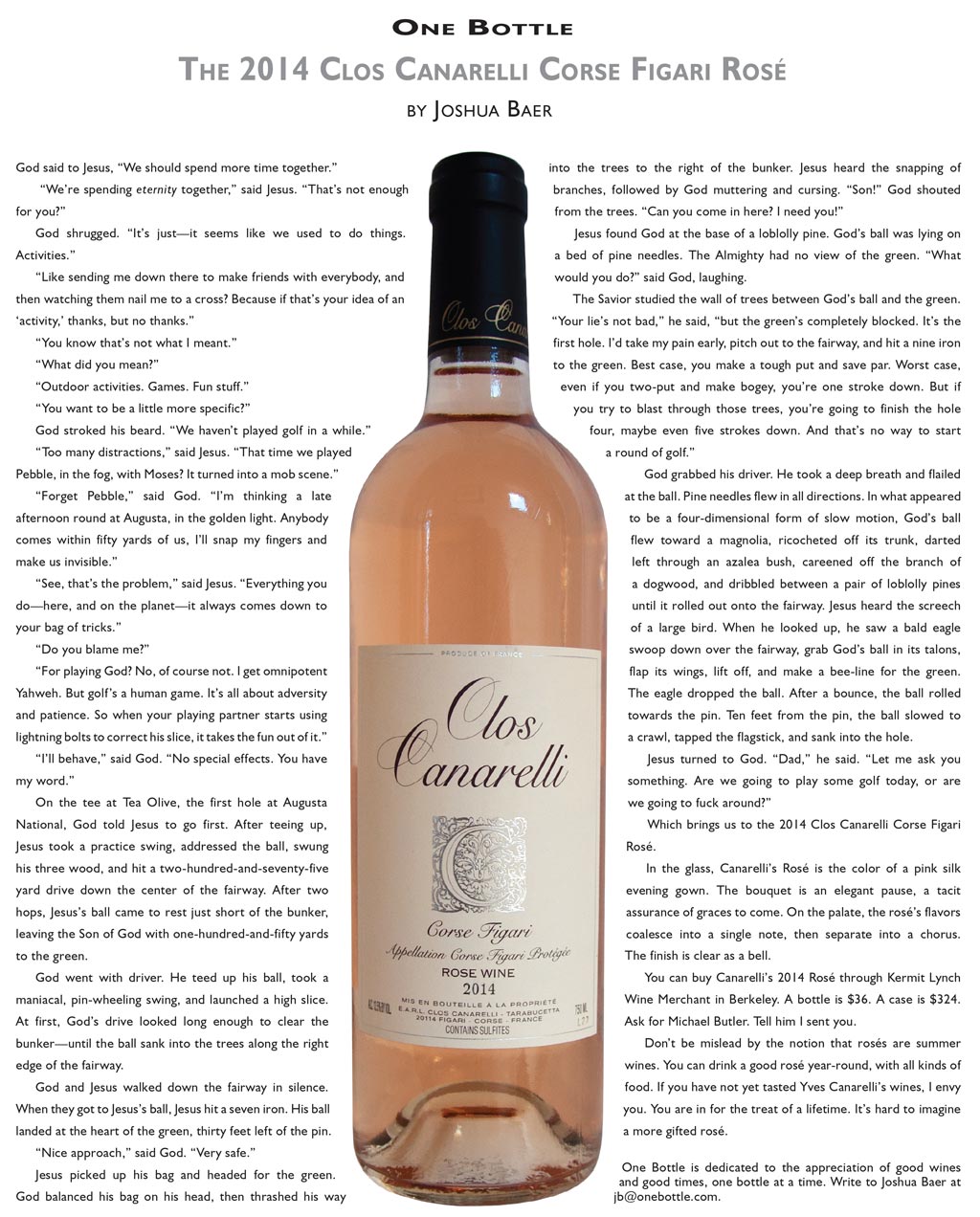2014 Clos Canarelli Corse Figari Rosé
God said to Jesus, “We should spend more time together.”
“We’re spending eternity together,” said Jesus. “That’s not enough for you?”
God shrugged. “It’s just—it seems like we used to do things. Activities.”
“Like sending me down there to make friends with everybody, and then watching them nail me to a cross? Because if that’s your idea of an ‘activity,’ thanks, but no thanks.”
“You know that’s not what I meant.”
“What did you mean?”
“Outdoor activities. Games. Fun stuff.”
“You want to be a little more specific?”
God stroked his beard. “We haven’t played golf in a while.”
“Too many distractions,” said Jesus. “That time we played Pebble, in the fog, with Moses? It turned into a mob scene.”
“Forget Pebble,” said God. “I’m thinking a late afternoon round at Augusta, in the golden light. Anybody comes within fifty yards of us, I’ll snap my fingers and make us invisible.”
“See, that’s the problem,” said Jesus. “Everything you do—here, and on the planet—it always comes down to your bag of tricks.”
“Do you blame me?”
“For playing God? No, of course not. I get omnipotent Yahweh. But golf’s a human game. It’s all about adversity and patience. So when your playing partner starts using lightning bolts to correct his slice, it takes the fun out of it.”
“I’ll behave,” said God. “No special effects. You have my word.”
On the tee at Tea Olive, the first hole at Augusta National, God told Jesus to go first. After teeing up, Jesus took a practice swing, then he addressed the ball, swung his three wood, and hit a two-hundred-and-seventy-five yard drive down the center of the fairway. After two hops, Jesus’s ball came to rest just short of the bunker, leaving the Son of God with one-hundred-and-fifty yards to the green.
God went with driver. He teed up his ball, took maniacal, pin-wheeling swing, and launched a high slice. At first, God’s drive looked long enough to clear the bunker—until the ball sank into the trees along the right edge of the fairway.
God and Jesus walked down the fairway in silence. When they got to Jesus’s ball, Jesus hit a seven iron. His ball landed at the heart of the green, thirty feet left of the pin.
“Nice approach,” said God. “Very safe.”
Jesus picked up his bag and headed for the green. God balanced his bag on his head, then he thrashed his way into the trees to the right of the bunker. Jesus heard the snapping of branches, followed by God muttering and cursing. “Son!” God shouted from the trees. “Can you come in here? I need you!”
Jesus found God at the base of a loblolly pine. God’s ball was lying on a bed of pine needles. The Almighty had no view of the green. “What would you do?” said God, laughing.
The Savior studied the wall of trees between God’s ball and the green. “Your lie’s not bad,” he said, “but the green’s completely blocked. It’s the first hole. I’d take my pain early, pitch out to the fairway, and hit a nine-iron to the green. Best case, you make a tough put and save par. Worst case, even if you two-put and make bogey, you’re one stroke down. But if you try to blast through those trees, you’re going to finish the hole four, maybe even five strokes down. And that’s no way to start a round of golf.”
God grabbed his driver. He took a deep breath and flailed at the ball. Pine needles flew in all directions. In what appeared to be a four-dimensional form of slow motion, God’s ball flew toward a magnolia, ricocheted off its trunk, darted left through an azalea bush, careened off the branch of a dogwood, and dribbled between a pair of loblolly pines until it rolled out onto the fairway. Jesus heard the screech of a large bird. When he looked up, he saw a bald eagle swoop down over the fairway, grab God’s ball in its talons, flap its wings, lift off, and make a bee-line for the green. The eagle dropped the ball. After a bounce, the ball rolled towards the pin. Ten feet from the pin, the ball slowed to a crawl, tapped the flagstick, and sank into the hole.
Jesus turned to God. “Dad,” he said. “Let me ask you something. Are we going to play some golf today, or are we going to fuck around?”
Which brings us to the 2014 Clos Canarelli Corse Figari Rosé.
In the glass, Canarelli’s Rosé is the color of a pink silk evening gown. The bouquet is an elegant pause, a tacit assurance of graces to come. On the palate, the rosé’s flavors coalesce into a single note, then they separate into a chorus. The finish is clear as a bell.
You can buy Canarelli’s 2014 Rosé through Kermit Lynch Wine Merchant in Berkeley. A bottle is $36. A case is $324. Ask for Michael Butler. Tell him I sent you.
Don’t be mislead by the notion that rosés are summer wines. You can drink a good rosé year-round, with all kinds of food. If you have not yet tasted Yves Canarelli’s wines, I envy you. You are in for a treat of a lifetime. It’s hard to imagine a more gifted rosé.
One Bottle is dedicated to the appreciation of good wines and good times, one bottle at a time. You can write to Joshua Baer at jb@onebottle.com.
